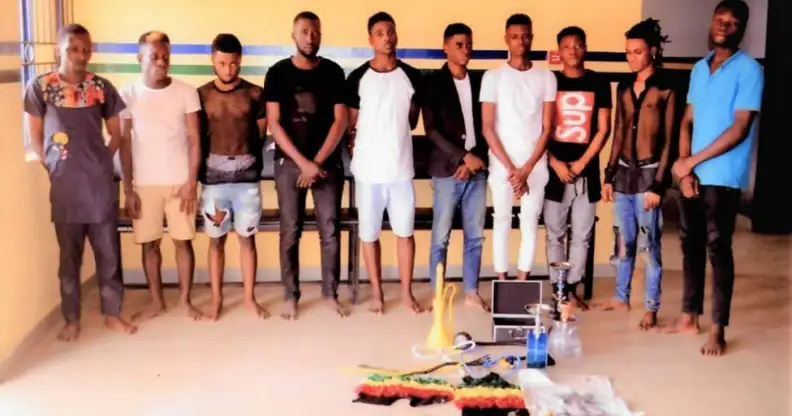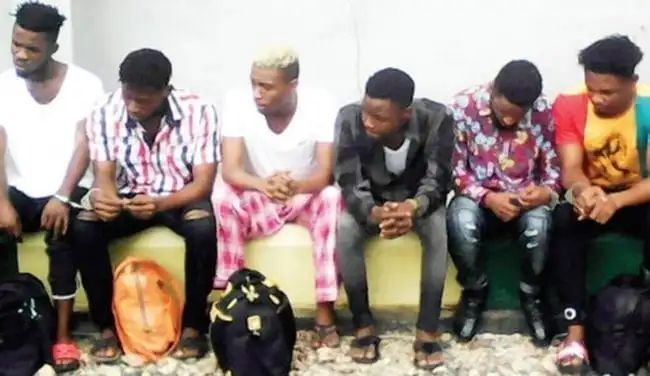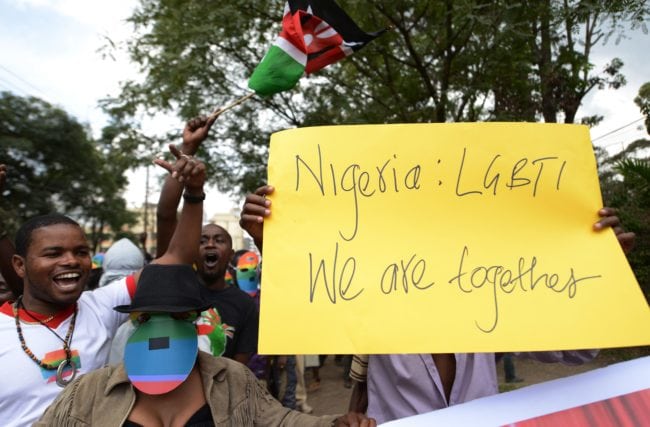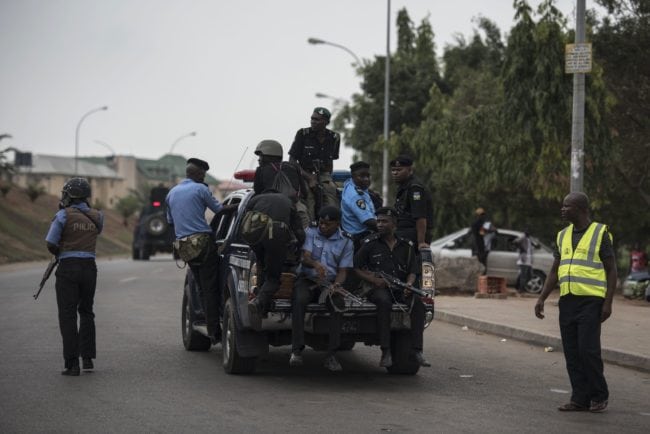Nigerian men arrested for having gay sex ‘were at a birthday party’

Some of the men who were arrested (lagos state police)
A number of men who were arrested by Nigerian police on suspicion of homosexuality have spoken out, saying they were at a birthday party.
Police in Nigeria reportedly raided Kelly Ann Hotel and Event Centre in Egbeda, Lagos, at about 2am on Sunday (August 26) and arrested 57 men on suspicion of having gay sex.
However, some of the detained men have now spoken out to local press, saying that they were at a friend’s birthday celebrations.
One man, James Brown, who is a dancer, told Gist Town that he had been hired to perform at the event.
The 20-year old, who said he is not gay, added that he is HIV-positive and claimed that police have taken away his medication.
“I went there to work and get paid. The party was on Saturday and it [was] meant to be overnight,” he told the publication.
“I was arrested and have been denied to even take my drugs which is for medical reasons.”
He also said that there were around 25 women at the party, but that police only arrested the men.
In Nigeria, people convicted of having gay sex can spend up to 14 years in prison – apart from in 12 northern states with Sharia law, where they are stoned to death.
The raid is the second such police action this month, after six men in the south-eastern state of Abia were arrested in a hotel for the same reason.

The men in Abia also denied being gay (abia state police)
Since they were in Lagos State, the 57 men will face a jail term rather than death, if convicted.
One of the arrested men, Wealth Olasunkanmi told Nigerian online newspaper Premium Times: “It was a birthday party and majority of us don’t know one another.
“I was invited by my friend Muyiwa for the party, and we were not only guys in the party, few ladies were with us and other ladies were in the hotel rooms getting dressed for the party.”
The 25-year old graduate added that the police had initially told them they were arrested for carrying illegal drugs but, when those carrying the substances came forward, they then “accused us of being homosexuals.”

Gay sex is punishable by death or 14 years in prison in Nigeria (SIMON MAINA/AFP/Getty)
He continued: “I am not one [gay], I went there to party. They also accused us of being initiated but no initiation material was founded with us or at the venue.”
Imohimi Edgal, the state’s police commissioner, told Premium Times: “On arrival, young men numbering about 80 were met in a hall taking different types of drinks including banned substance like Tramadol [and] Shisha laced with substances suspected to be Marijuana.
“When the men sighted the police, they took to their heels but the police arrested 57 of them.”

Nigerian police have arrested many on suspicion of gay sex (STEFAN HEUNIS/AFP/Getty)
Last year, 42 men were arrested at a hotel in Lagos state and charged with performing “homosexual acts.”
Earlier this year, Nigerian politicians hit out at Prime Minister Theresa May after the British leader promoted LGBT+ rights in the Commonwealth countries that still criminalise homosexuality.
During the Commonwealth Heads of Government Meeting (CHOGM) meeting in April, May spoke about the UK’s regret at imposing anti-gay laws in former colonies.
She noted that 36 of the 53 Commonwealth countries continue to criminalise homosexuality, saying: “I deeply regret the fact that such laws were introduced, and the legacy of discrimination, violence and even death that persists today.”

